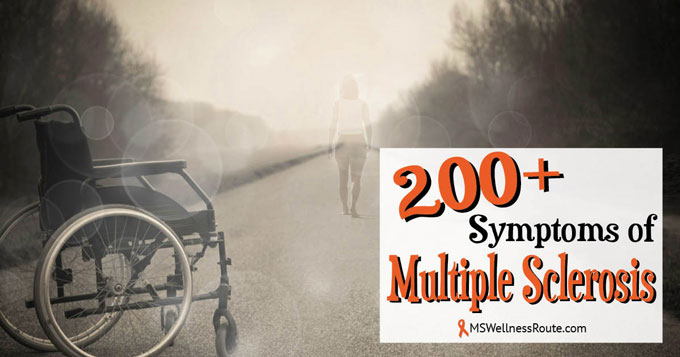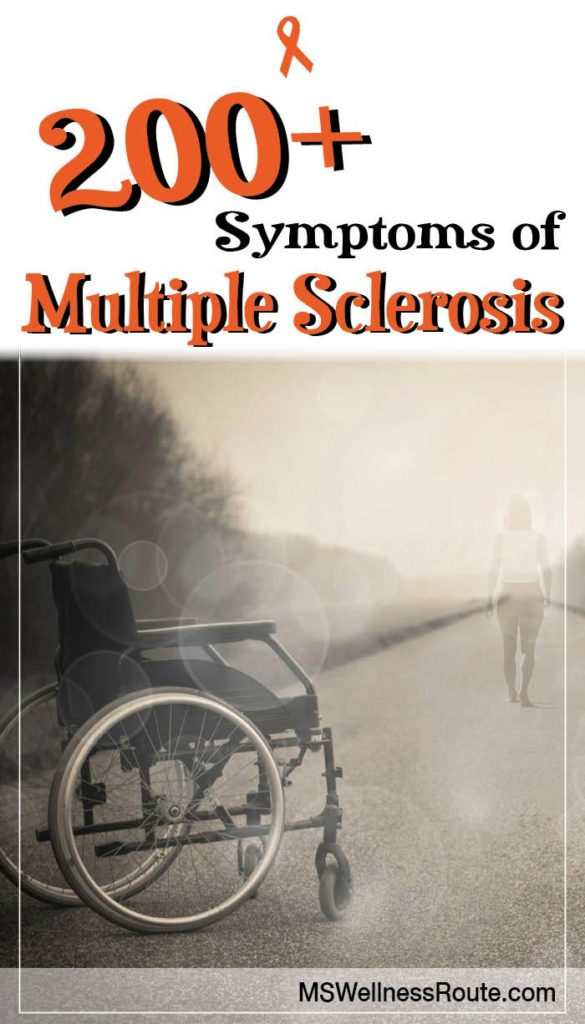Last Updated on January 29, 2025 by Cathy

Who would have guessed those strange feelings you had years ago would turn your life upside down? Or those different symptoms from vision problems, numbness, or extreme fatigue were connected. It’s amazing how the central nervous symptom (CNS) can affect every aspect of your body. Below is a list of 200+ symptoms of multiple sclerosis (MS), you may not be aware of.
MS destroys the protective covering of the nerves and causes permanent neurological damage. It has the power to change every part of your body, the CNS connects your brain thoughts with your body. When MS begins damaging the myelin, it damages the CNS. According to the National MS Society, MS affects 2.3 million people worldwide. Unfortunately, it can take years to diagnose due to the different symptoms.
MS Symptoms
When I was 15 years old, I went blind in my left eye. It turned out to be optic neuritis. My ophthalmologist told me “you might have MS someday.” Unfortunately, he was right. My eye went back to 100% normal but over the next several years I would get strange sensations off and on. I knew something was wrong and I ignored them, but deep down inside I knew it was MS.
Doctors prescribed different medications for individual symptoms. They don’t look at the root of the problem. Sometimes if you’re complaining about usual symptoms the doctor thinks it’s all in your head. Once a person is finally diagnosed with MS, neurologist pushes their toxic medications. Which also comes with many terrible side effects. The neurologist then prescribes more medications for the side effects. It’s a vicious cycle.

Doctors rely on documented studies for MS and don’t look into the patient’s health history. They don’t look outside the box, they only stick with what they learned in school. When was the last time your neurologist took your whole health history into account? If they were anything like my neurologist the answer would be – never. Then maybe it’s time to fire your neurologist and find a doctor that will work with you. After all, you are in charge of your own body.
Triggers To MS
Researchers know chronic inflammation can cause MS. The problem is, that everyone with MS is different. What triggered one person’s MS isn’t what triggered your MS. And what helps put one person’s MS into remission may not be the same route you need to take. The CNS is one of the slowest systems in the body to heal. Just because one person went into remission within six months doesn’t mean that’s how long it will take for you.
The time will depend on the severity of MS you have. Also, you will need to do some detective work to figure out what chronic inflammation you’re dealing with. I was able to stop the progression once I changed my diet but, I wasn’t able to reverse my symptoms. It wasn’t until years later, that I realized I was dealing with a severe case of systemic yeast overgrowth. I quit eating lots of natural sugars and carbohydrates. I also started taking antifungals, and that is when I started seeing improvements.
Possible triggers to MS:
- Diet (processed foods, refined sugar, refined carbs, food allergies, etc.)
- Infections (bacterial overgrowth, parasites, viruses, and yeast overgrowth)
- Environmental Toxins (heavy metals, mold, pesticides, etc.)
- Chronic Stress (especially emotional stress)
- Hormones (cortisol, insulin, vitamin D – yes, it’s a hormone)
- Genetics (you can’t change your genes but you can change your gene expression by living a healthy lifestyle)
Getting To The Root
It helps to see a functional medicine doctor (FMD) get to the root of your problems. You can find a doctor in your area by searching for their website: Find A Practitioner. Whether you see an FMD or not, it’s a good idea to gather as much information as possible.
It’s best to get started right away to stop the progression from getting worst. You’ll have to go back before your symptoms began, even back before you were born. Researchers believe people with MS have a genetic code putting them at a higher risk. They believe it was some lifestyle or environmental factor that triggered MS.

Every person is different and everyone will have a different set of symptoms. Depending on which type of MS you have it also plays a factor in the severity and quickness of the progression. Left untreated the severity of MS symptoms worsens with age. Don’t believe one of these symptoms can’t be due to MS, even if your doctor tells you it isn’t. It’s your nervous system that affects every part of your body.
Remember, everyone is different and you know when something doesn’t feel right. If you’re currently taking any medications it could be a side effect and not actually MS. Before starting any medication pay attention to your body for reactions. That includes vitamins and supplements. If you begin to suffer from any of these symptoms it may be a side effect due to the drug you’re taking.
Here’s a list of MS symptoms you may have, it even includes symptoms your doctor doesn’t associate with MS. So let’s get started!
Bowel And Bladder Issues:
- A bladder that doesn’t empty
- Bladder infections
- Constipation
- Diarrhea
- Frequency
- Hemorrhoids
- Incontinence
- Kidney infections
- Loss of control of bowels
- Muscle damage
- Nerve damage
- Overactive bladder
- Painful urination
- Spastic bladder
- Underactive bladder
- Urinary tract infections
- Urinary urgency
Body:
- Blood-brain barrier breakdown
- Chronic inflammation
- Damage myelin
- Damaged nerves
- Genetics
- Lesions on the brain (plaques)
- Other autoimmune diseases (once you have one disease, your risk is higher for more)
- Prevalence of diabetes
- Weak immune system

Body Temperature:
- Cold extremities (hands and feet)
- Cold intolerance
- Cold sweats
- Excessive perspiration
- Heat intolerance
- Hypersensitivity
- Hypothermia
- Low basal body temperature, below 97.8° Fahrenheit (temperature upon rising in the morning)
- Night sweats
- No perspiration
- Overheating
- Raynaud’s syndrome
- Shivering
Cardiovascular:
- Chest pain
- Chest tightness
- Congestive heart failure
- Deep vein thrombosis (blood clot)
- Elevated C-reactive protein (CRP)
- Elevated homocysteine
- Fast heart rhythm
- Heart attack
- Heart disease
- High blood sugar
- High blood pressure
- Low blood sugar
- Low blood pressure
- Palpitations (heart beating too fast or slow, skipping a beat)
- Peripheral vascular disease
- Poor circulation
- Poor blood flow in the veins
- Stroke
Digestion:
- Bad bacteria (too much)
- Digestive issues
- Food allergies/intolerances
- Lack of good bacteria
- Leaky gut
- Nutrient
- Poor digestion
- Small intestinal bacterial overgrowth (SIBO)
- Yeast overgrowth (Candida)
Emotional:
- Anger
- Anxiety
- Cognitive changes
- Confusion
- Depression
- Disbelief
- Denial
- Guilt
- Irritable
- Isolation
- Loneliness
- Memory
- Mood swings
- Personality changes
- Relationship problems
- Stress
- Suicidal thoughts
Get A Free “Symptom Questionnaire” at the bottom of this article.
Energy Level And Sleep:
- Brain fog
- Chronic fatigue
- Inability to concentrate
- Insomnia
- Frequently oversleep
- Narcolepsy (inability to regulate sleep-wake cycles)
- Need a nap in the afternoon
- Nutrient deficiency
- Restless leg syndrome (RLS)
- Sleep apnea
- Snoring
- Stress
- Vitamin deficiency
- Weak immune system
- Weakness
- Wake up exhausted
Infections:
- Bacterial
- Candida
- Epstein-Barr virus (EBV)
- Herpesviruses
- Human herpes virus-6 (HHV-6)
- Lyme disease
- Measles virus
- Parasites
- Shingles
- Small intestinal bacteria overgrowth (SIBO)
- Rhinovirus
Numbness And Tingling:
- Arms
- Back
- Face
- Feet
- Hands
- Head
- Legs
- Mouth
- Muscle twitching
- Spine
- …basically anywhere
Pain:
- Aching
- Back
- Burning sensation
- Chronic neurogenic
- Cramping
- Dull pain
- Eye pain
- Headaches
- Hip
- Hyperacusis (extreme pain caused by everyday noises)
- Joints
- Ligaments
- Migraines
- Musculoskeletal
- Neck
- Paroxysmal (acute pain)
- Pressure sores
- Shooting
- Shoulder
- Stabbing
- Tendons
- Throbbing
- Trigeminal neuralgia (stabbing/electrical nerve pain in the face)
Respiratory:
- Aspiration
- Breathing difficulties
- Dyspnea (shortness of breath)
- Inflammation of the lungs
- Loss of endurance
- Loss of ventilatory muscles
- Low oxygen level
- Shallow breathing
Sensory:
- Boot or glove sensation
- Dental (worsening of symptoms following dental treatment)
- Dizziness
- Electrical sensations
- Flu-like symptoms
- Food sensitivities
- Hearing issues
- Heavy legs
- Humidity (worsening of systems)
- Itching
- Loss of balance
- MS hug
- Mobility limitations
- Motor skills
- Muscle spasms
- Nausea
- Numbness
- Optic Neuritis
- Paralysis
- Pins and needles sensation
- Poor hand-eye coordination
- Seizures
- Sexual dysfunction
- Slurring of speech
- Spasticity
- Squeezing sensation
- Stiffness
- Swallowing
- Taste (diminished sense of taste)
- Tingling
- Tinnitus (ringing in the ears)
- Tremors
- Vertigo
- Vision issues
- Weakness
Skin:
- Acne
- Bruising
- Burning
- Cystic acne
- Dry Skin
- Dysaesthesia (unpleasant sensation when touched)
- Flushing
- Fungal infections (skin and nails)
- Hives
- Injection soreness
- Itching
- Oral thrush (mouth)
- Phantom sensations
- Rash
Skeletal:
- Broken bone
- Fractures
- Foot drop
- Gait
- High fall risk
- Low bone density
- Osteoporosis
- Osteopenia
- Walking difficulties
Now that’s a long list of symptoms! If you’re feeling something weird and you don’t see on this list it’s probably MS. It’s not all doom and gloom though. If you take action now to stop the progression you can avoid most of these symptoms. The sooner you start the better off you will be in the long run. Below is a list of different treatments people have tried:

Treatments:
- Acupuncture
- Alternative medicine
- Bee therapy
- Chemotherapy
- Cognitive rehabilitation
- Conventional medicine
- Counseling
- Diet
- Essential oils
- Exercise
- Fecal transplant
- Functional medicine
- Herbal remedies
- High vitamin D
- Holistic therapy
- Homecare
- Massage
- Medical marijuana
- Meditation
- Natural therapy
- Occupational therapy
- Pharmaceutical medications
- Physical therapy
- Social services
- Speech therapy
- Stem cell treatment
- Stretching
- Vitamins and supplements
- Vocational rehabilitation
There are many different treatments for MS. For the disease itself or for dealing with the symptoms caused by MS. Find what works best for you and don’t give up. It usually takes years for MS to show up so it can take time to claim it down.
Get A Free Symptom Questionnaire:
Get the password for the library including the Symptom Questionnaire to track your progress as you’re healing, by filling out this form:
Want To Remember This Pin? Pin It To Your Favorite Pinterest Board!

200+ Symptoms of Multiple Sclerosis





